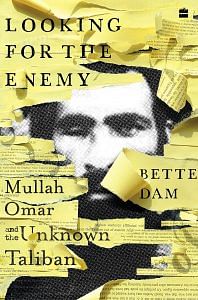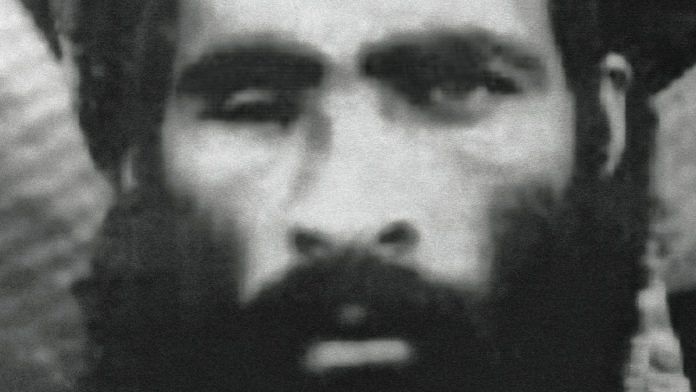Sometime later, I accidentally came across a cassette tape from 1996 with a recording of Mullah Omar himself talking about these early days in front of a big crowd of mullahs. My Pashto teacher had been there when Omar spoke, reflecting on this period, and the teacher had recorded the speech. This was the first documented recording that I found of Mullah Omar speaking.
When I pressed ‘Play’, I heard a dark voice speaking slowly. It was the first time I had heard Omar’s voice. Everyone in my office in Kabul was very excited. I had been investigating this man for two years by that point but we had never heard him or seen him on film. We knew that there were audio recordings in the archives of the national radio and television organization Ariana in Kabul, but the archivists did not dare give us access. They were afraid that the recordings would be leaked and become popular among the Afghan people.
Mullah Omar spoke like an old man, talking at an unhurried, even sluggish pace. In his pronunciation, the Pashto vowels were longer than they needed to be. He sounded like a mix between an ageing, uneducated villager with a bit of a stutter – he would repeat words like ‘I’ (I, I, I) as if he had forgotten what he wanted to say – and a Southern Baptist preacher addressing his flock with long-drawn-out arguments. It was as if he would much rather not be standing behind the lectern with my Pashto teacher’s microphone and tape recorder in front of his nose. He sounded like a man who did not enjoy speaking at formal occasions like this one.
‘So this is how the Taliban began,’ said the dark voice. He was clearly not reading from a printed or handwritten text in front of him. He talked as if he were standing in front of his
house in Haji Ibrahim and telling a passing neighbor the story of how he became the leader.
Also read: Taliban takes step forward by reopening girls schools. But don’t trust it to be inclusive yet
Mullah Omar spoke of the immorality that was rampant in Haji Ibrahim in 1994. There were some bad people around then and the situation was unstable, he said. People were plundering and stealing, murders were committed for no reason, and the bodies could not be buried afterwards. He mentioned the roadblocks set up by the toll collectors. In his speech, he admitted that he had doubts about whether he should be the one tackling this. ‘Allah tells us that no one is responsible for more than he can cope with,’ he said, quoting the Quran. But he also said that he had no option other than to trust in Allah. Then he gave a detailed account of how the Taliban came into being.
‘Some people wonder how this movement started, under what “secret circumstances”. Who supported us? Who organized us? And who trained us?’ Without answering these questions, Mullah Omar related how he visited the hujras on a scooter to mobilise students for the campaign against the toll collectors. ‘We students,’ Omar said, using the word taliban, ‘need to rise up. If we want to serve Allah, we have to stop studying and start fighting.’
According to Mullah Omar, the students at the first hujras he went to were reluctant and he could not rely on their support. They would say, ‘We could manage Friday evening,’ for instance, but he thought that was not enough. In the end, a few students – he said literally ‘five to seven’ – agreed to join him. After this, the movement soon grew to over fifty students. They gathered in his mosque in Haji Ibrahim. That was how it all started, according to Mullah Omar.
At the end of his speech, Mullah Omar referred to a dream he’d had of angels with soft
hands. We don’t take dreams very seriously in the West but I have discovered that many in Kandahar believe in them. Even my Afghan friend who has often been to America did, as I found out to my surprise. She once asked for advice in her dreams on whether she should marry the man she was in love with, a request known as istikhara.
As the tape played, I heard Omar fall silent after describing the angels in his dream. A moment later, I heard him fighting back his tears. My Pashto teacher confirmed that he had seen Mullah Omar become emotional as he talked about his dream. The room was deathly quiet. But Omar regained control of himself and continued, ‘Then I said the angels should touch me.’ At these words, the audience jumped up and cheered as if he had told them that these angels were a sign Allah himself had chosen him. The audience started to chant rallying cries such as ‘Allah is great’ and ‘long live Islam’. Mullah Omar called on them to be silent and concluded his talk: ‘So that was the start of the movement, and everything got going within twenty-four hours. That’s what happened.’
When the fighters – a mix of hujra students recruited by Mullah Omar and men from Haji Bashar’s militias – gathered to prepare for the confrontation with the toll collectors, they were in for a surprise. Mullah Omar thought Haji Bashar’s men in particular were not in a fit state for his religious battle. Their hair had not been cut or washed, their robes were dirty and full of holes, and most of them smoked hashish non-stop as well.
Also read: Afghan soil would not be used against neighbours, Taliban govt assures Pak NSA during Kabul visit
‘If I’m going to be leading this uprising, your men will need to look sharper,’ said Mullah Omar when he arrived at Haji Bashar’s command post. Surrounded by militiamen, Omar announced that everyone with unkempt hair would have to have it cut. The fighters were amazed. Who on earth did this man think he was? One of Haji Bashar’s commanders said he heard horrified voices on his walkie-talkie that day. ‘We’ve got some crazy guy here who wants to cut our hair,’ the young men had said. ‘What should we do?’ ‘He’s one of us,’ replied the commander.
Haji Bashar had to go first.13 Once he had had his hair cut, the other young militants underwent the process without further protest. Incidentally, the knife was so blunt that it left the fighters with spiky hair. One of them was so disgusted by what he saw in the mirror that he grabbed a sharper razor blade and shaved all his hair off.
Omar wanted the fight to be in accordance with strict rules of conduct, as became clear from another incident. Just before the fighting was about to start, Haji Bashar saw an opportunity to settle a tribal dispute in which his family’s honor was at stake. He had a rival in his district hanged. Mullah Omar was furious. Honor killings were against the rules of Islam and it was even more important in this particular fight for everyone to set a good example, including Haji Bashar. It didn’t matter to Mullah Omar that Bashar’s rival had probably been an accomplice of the Communists; the man had never been tried for that.
In fact, the clean-cut, neatly dressed fighters brought together by Haji Bashar and Mullah Omar would not be seeing action for a while yet, as the first task was to secure the support of one of the key leaders in Kandahar Province: Naqibullah.15 He was an influential and opportunistic strongman from the days of the civil war. In 1979 he had supported the Communists, but he later joined the jihad. Now he supported Rabbani, the president clinging to power in the distant capital Kabul. Naqibullah was the local Minister of Defense, which meant he controlled all the weapons in Kandahar Province. Haji Bashar and Mullah Omar soon managed to get Naqibullah on their side. He endorsed their holy fight and gave Haji Bashar large quantities of weapons and cash.
According to the Quran, if a conflict arises, you must first try to resolve it by talking, and only use violence if all else fails. I have also read this in Michael Griffin’s book Reaping the Whirlwind, which says that a lot of what the movement achieved in its early days was done by talking to people.16 But it wasn’t Mullah Omar who did the talking; it was mostly Haji Bashar. He had the money, the power and the necessary connections for this uprising. As Haji Bashar’s deputy said to me, without Haji Bashar there would have been no Taliban.
Also read: What my 20 years in Afghanistan taught me about the Taliban
Mullah Omar sat in on the discussions mainly to lend religious legitimacy to the endeavor. Haji Bashar would point to the silent man next to him and say, ‘He’s the leader of the movement.’ Naqibullah’s support had a positive effect on the negotiations with the first few toll collectors and their commanders. One after another, they surrendered without a shot being fired. The first real challenge for Omar’s movement was the warlord Amir Lalai. He was one of the most powerful tribal leaders in Kandahar, with at least a hundred toll collectors in his employ on the road traversing the province.
Amir Lalai was not impressed by the alliance that Haji Bashar and Mullah Omar had forged with Naqibullah. He was one of Naqibullah’s rivals and was determined to hold out against the alliance. Mullah Omar responded to his resistance by turning up at his house with a large group of combatants. ‘Join us,’ he warned Amir Lalai.
The large group of men he had brought made clear that he was starting to lose patience. Amir Lalai did not yield, saying, ‘Try your luck with the others first.’ At which point Mullah Omar’s students went on the attack. Amir Lalai’s local men soon fled and his toll collectors deserted their posts on the route from Haji Ibrahim to Kandahar. Omar’s students planted their first makeshift white flags, pieces of cloth attached to broken-off branches and bearing the hastily written Arabic words: La ilaha illallah Muhammadur Rasulullah – ‘There is no god but Allah and Muhammad is his Prophet.’
The most notorious toll commander on the road, known as Saleh the Child Rapist because he owned underage sex slaves, was dealt with in a similar way to Amir Lalai.
Omar held talks with the man at least three times and asked him to withdraw voluntarily. Saleh too refused to surrender initially. He was not in awe of the new movement, which he thought weak and easy to defeat. Mullah Omar had his men surround the roadblock and gave orders for them to shoot. Saleh fought fire with fire but eventually had to admit defeat.
Both these victories were followed by the discovery of cases full of weapons that Omar’s men took with them to add to their stockpiles. The movement was turning into an army that could no longer be seen as a band of well-meaning mullahs and students fighting the good fight without weapons or violence.
 This excerpt from Looking for the Enemy by Bette Dam has been published with permission from HarperCollins India.
This excerpt from Looking for the Enemy by Bette Dam has been published with permission from HarperCollins India.



